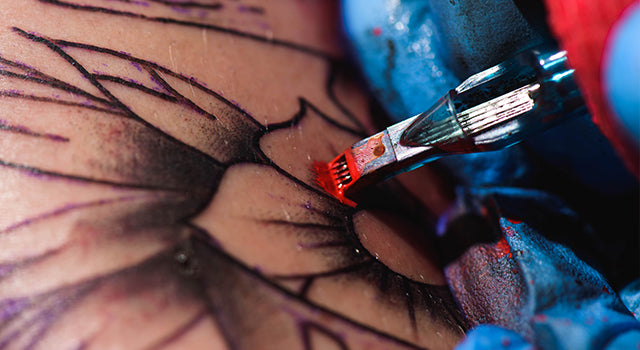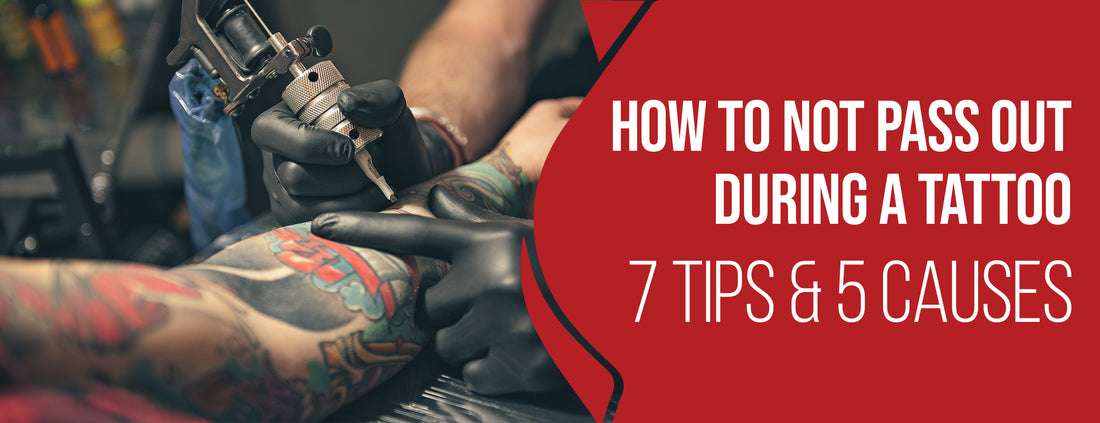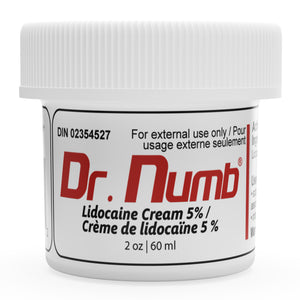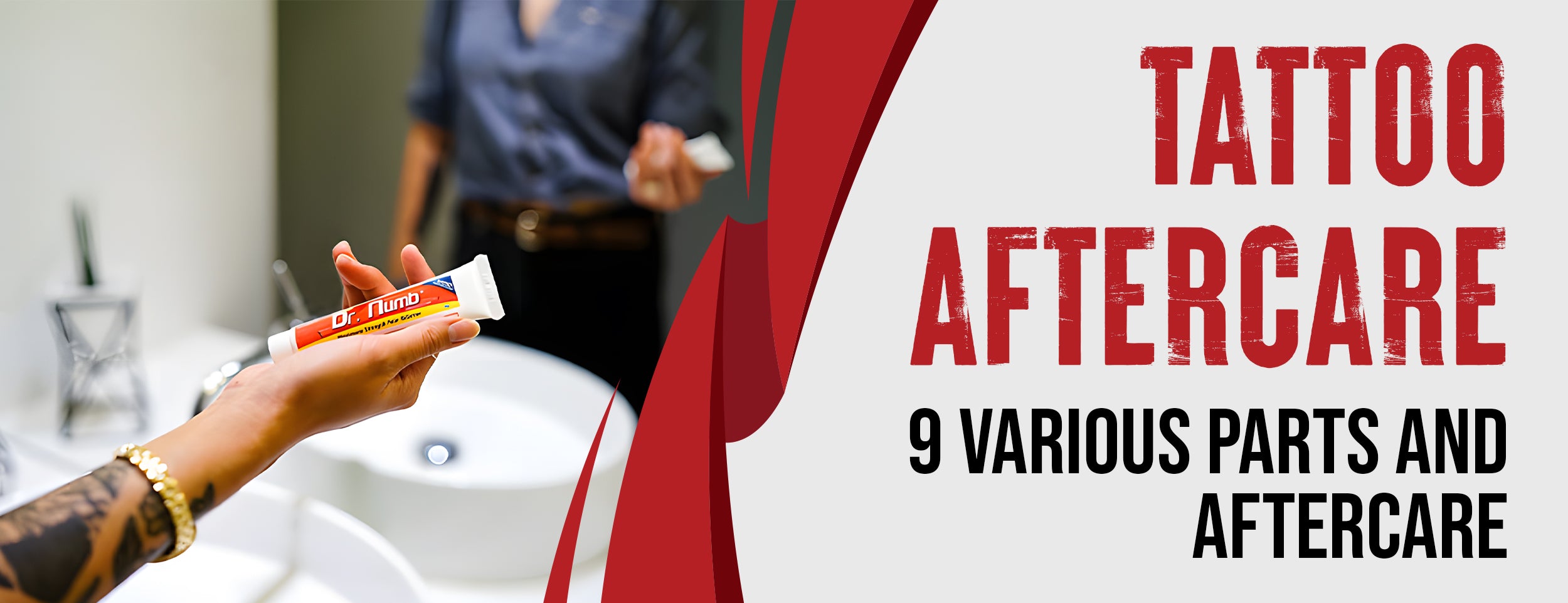A tattoo can be seriously affected by passing out during the procedure. It may cause the artist to lose concentration and make mistakes, resulting in a poorly done tattoo. It can also cause the person getting the tattoo to move, leading to an uneven design. Passing out can cause injuries like falling or hitting one's head. It can also expose the tattoo to infections if the person is not conscious to protect it.
Techniques such as breathing exercises, muscle contractions, and relaxation may help reduce stress during tattoo placement. A tattoo artist can help you with distraction techniques by talking or shouting during the procedure.
In this post, we will explore how to not pass out during a tattoo, the implications of passing out during the process, and provide tips on how to prevent it from happening.
How to Not Pass Out During a Tattoo: 7 Tips

It is common for people to feel anxious and even pass out during the procedure. You can take several steps to prepare yourself and avoid passing out during a tattoo. Here are some tips and tricks that can help you stay calm and comfortable throughout the process:
Hydrate Yourself Before the Appointment
Staying hydrated is one of the fundamental steps to preventing fainting or passing out during a tattoo. Dehydration can lead to dizziness and fainting, making it crucial to drink plenty of water.
- Drink 8-10 glasses of water a day before the appointment.
- Dehydration can be caused by alcohol and caffeine.
- Drink electrolyte-rich fluidsto keep yourself hydrated.
Eat a Balanced Meal Before the Appointment
Eating a balanced meal before your appointment will help prevent dizziness and lower blood sugar levels prevent dizziness.
- Eat a healthy meal containing protein, carbohydrates, and healthy fats.
- Eat for proper digestion at least 2-3 hours before the appointment.
Be Aware of Your Limitations
You must know your physical and psychological limitations and inform your tattoo artist accordingly.
- Communicate with your tattoo artist about your apprehensions and fears.
- Don't push yourself beyond your limits.
- Take breaks and rest when needed.
Focus on Your Breathing
Stress and anxiety can be reduced with deep breathing techniques and improve the oxygen supply to the brain.
- Take deep breaths and exhale slowly during the tattooing process.
- Focus on your breathing to distract from the pain.

Distract Yourself
Distracting yourself during the tattooing process can help in reducing pain and the risk of passing out.
- Listen to music or an audiobook.
- Play a game or watch videos.
- Focus on a picture on the ceiling or a wall.
Consider Numbing Creams or Pain Relief Options
If you have a low pain tolerance, consider using numbing creams or pain relievers before or during the tattoo session. Here are a few options that might work for you:
- Topical numbing creams with lidocaine.
- Over-the-counter pain relievers such as ibuprofen.
- Prescription pain medication (consult with your doctor).
Communicate with Your Tattoo Artist
One of the main reasons people faint during tattoos is to communicate more with their tattoo artist. It's important to let them know if you're feeling overwhelmed or uncomfortable with the session. Here are a few ways to communicate with your tattoo artist:
- Be honest about your pain tolerance.
- Ask for breaks if needed.
- Let the tattoo artist know if you feel lightheaded or faint.
5 Causes of Passing Out During a Tattoo

First-timers often feel dizzy or faint during tattoos, especially if it's their first time. Certain factors can increase your risk of passing out. Here are the reasons for passing out during a tattoo:
Pain
One of the most prominent reasons for passing out during the tattooing process is pain. Tattoos involve a needle puncturing the skin repeatedly, which can be a harrowing experience for some people. When the body experiences intense pain, it can trigger a response known as a vasovagal syncope. This sudden blood pressure and heart rate elevation can cause a person to faint.
Anxiety and Fear
It's normal to feel anxious when getting a tattoo, especially if it's your first time. These feelings can contribute to passing out as adrenaline can be released by the body and trigger an unsettling response in the nervous system. Fear of needles or blood can also induce fainting.
Dehydration
Dehydration is a common cause of fainting during a tattoo. The body's blood volume decreases when dehydrated, making it easier to experience sudden blood pressure drops. It's essential to ensure proper hydration before and during the tattoo.

Poor Nutrition
Another significant factor that can cause fainting during a tattoo is poor nutrition. If your body isn’t getting the essential nutrients it needs, it can cause your blood sugar levels to drop, leading to fainting.
Vasovagal Syncope
There is a drop in blood pressure and heart rate that can cause fainting, often in response to a stressful trigger like the pain or fear associated with getting a tattoo.
3 Effects of Passing Out While Getting a Tattoo
While getting a tattoo, some people may experience a sudden drop in blood pressure, making them faint. A tattoo that causes a person to pass out can have physical and psychological consequences.
Physical Impact
- Disruption of the Tattoo Process: Fainting can cause sudden movements, which may lead to a mistake in the tattoo design or placement. This can affect the overall aesthetic outcome of the tattoo.
- Risk of Injury: If you faint, you might fall off the chair or hit nearby objects, leading to potential injuries.
- Health Complications: Fainting can indicate underlying health issues like low blood pressure or blood sugar levels. It’s crucial to seek medical attention if you frequently faint.
Psychological Effects

- Fear and Anxiety: Experiencing a fainting spell during a tattoo session can lead to fear and anxiety about future sessions. This can deter some people from getting more tattoos.
- Embarrassment: Some people might feel embarrassed about fainting, especially if it happens in a public tattoo studio.
Impact on the Tattoo Artist
- Increased Stress: The artist might feel stressed or anxious about causing pain or discomfort to their clients.
- Professional Challenges: Fainting incidents can interrupt the tattooing process, making it more challenging for the artist to complete their work.

Conclusion
It can be an exciting and rewarding experience to get a tattoo, but you need to take precautions to prevent fainting during the procedure. Whether you're prone to anxiety or have had past negative experiences, there are steps you can take to help ensure a smooth and comfortable tattoo session.
Following our tips and tricks, you can feel confident and prepared for your next tattoo appointment. Stay hydrated, relaxed, and nourished to prevent the Vaso-vagal response. And choose a reputable artist who prioritizes your safety and wellbeing.


















![Antibiotics and Tattoos: 3 Risks and 3 Effects [with 4 Precautions]](http://drnumb.ca/cdn/shop/articles/Can_You_Get_Tattooed_On_Antibiotics__3_Risks_and_3_Effects_4_Precautions.jpg?v=1714128292)

